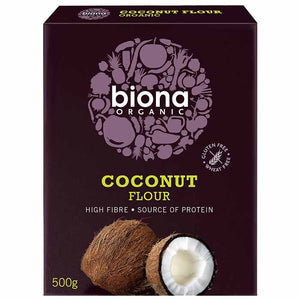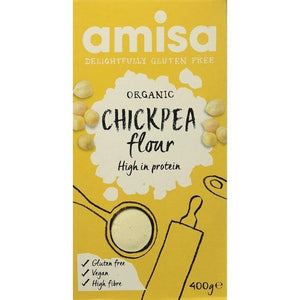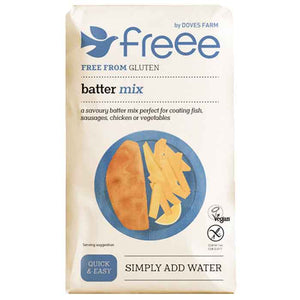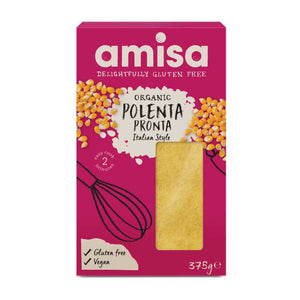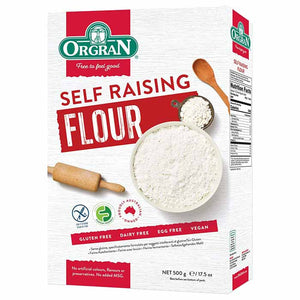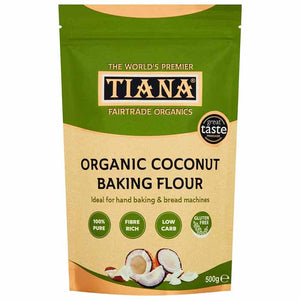Baking Flour
Flour. It may seem so simple, but organic flour is an essential kitchen staple - people have been making it since 6,000 BC! Flour is used to make bread, use it to coat food, and even use it to bind ingredients together. Its versatility makes it a must-have in every kitchen! While wheat flour is the most common among all varieties, there has been a growing number of other flour types, such as almond flour, coconut flour, chickpea flour… and so on. That’s because as much as 6% of the entire world’s population can’t have gluten and there’s a growing number of people choosing alternative flour for the associated health benefits. Read more
Sort By ×
- Featured
- Price, low to high
- Price, high to low
- Alphabetically, A-Z
- Alphabetically, Z-A
- Date, old to new
- Date, new to old
- Best Selling
For many, the omission of gluten in their diet is voluntary - not thrust upon them by any allergies or sensitivities. They choose this because a lot of products made from gluten aren’t that nutritious. So, people opt to skip those in favour of eating better. While that might not be true for ALL gluten-based goodies, it’s always a good thing to watch what you eat. We help you find and buy flour that’s right for you!
Everything You Need To Know About Flour
Not a lot of people know that flour itself has nutritional value! If we’re looking at a cup of your all-purpose flour, it has about 12.9 grams of protein and 3.4 grams of fibre. As for caloric content, it’s roughly 455 calories. In that one cup of all-purpose flour, you also get 95 grams of carbs and 1.2 grams of fat.
Think of the nutritional value of all-purpose flour as your baseline. If you want a low-carb alternative, you can grab almond flour. If you’re thinking that the calories are just too much, get buckwheat or whole wheat flour.
Now that we’ve got the numbers down, let’s go over some things you need to know about flour… like storage! Generally, flour lasts 6 months (give or take). Yes, it’s shelf-stable (meaning you can store it in a cool and dry cupboard just fine), but you can also store it in the freezer to help it last a little bit longer. If you’re worried about it possibly getting wet while stored in the freezer, you can add a layer of protection by keeping it in a Ziploc bag or any airtight container. It’s also not ideal to mix your old bag of flour with your new one.
Great Flour Brands To Try
Going gluten-free is made easy with this bag of Organic Coconut Flour by Biona! It’s high in fibre and full of protein. It can replace regular flour in all kinds of baking recipes. When you buy flour online, Biona is often a brand that’s all-around great!
Amisa’s Gluten-Free Organic Chickpea Flour
The name says it all, really! This high-protein chickpea flour is organic and gluten-free. You can make delicious falafels, panelle flatbreads, and hummus with this one. You can also use it to make coatings and batter for fried food.
Doves Farm’s Organic Coconut Flour
Another coconut flour makes it on our list! Doves Farm’s Organic Coconut Flour is a great alternative to the kitchen essential, flour. It has a rich and nutty taste, too! Make gluten-free and grain-free brownies, cakes, cookies, and pancakes with this one!
Tiana Fair Trade Organics’ Organic Pure Coconut Flour
As an alternative to wheat and grain flours, Tiana Fair Trade Organics’ Organic Pure Coconut Flour is a great all-arounder. It’s used by home bakers and can even be used in bread machines. This all-purpose flour is also free from additives and preservatives!
Frequently Asked Questions
Where Can I Buy Flour Online?
Well, you’re in the right place! PlantX is a great place to buy flour online. We have gluten-free flour, organic flour, and other kinds of flour.
And it’s not just flour that you’ll find here. You can buy flour that’s a little bit harder to find, such as Biona’s Organic Polenta Bramata! By the way, that's gluten-free flour!
Is it 1:1 ratio when substituting regular flour with other flour varieties?
Sometimes yes, sometimes no. Some manufacturers make their flour an easy 1:1 substitute. But, some flour types tend to have different textures and levels of "dryness". So always check the manufacturer's suggestions!
While this ratio isn’t that necessary for basic frying or batter making, it is important for baking! Baking often requires more precise measurements.
Can I use almond flour or other non-wheat flour for deep-frying?
You could! Some flours tend to absorb more than others. This is true for both coating and batter-making purposes. So, it’s really something to consider when you want to use different kinds of flour.
There are some who swear by using rice flour for deep-frying. Why not buy rice flour online and give that a go?
Aside from frying and baking, what else can I use flour for?
Gluten-free flour can be used to thicken sauces and make gravy. If you’d like to spend a little time developing a new kitchen skill, you can also make some fresh pasta at home using non-wheat flour!
Other foods you can try your hand at making are dumplings. Or whip up some tortillas or some quesadillas!
What's the healthiest organic flour?
Some of the healthiest and most nutritious flours are coconut flour, almond flour, and buckwheat flour. wheat flour is among the healthiest, too. Since it's one of the easiest to find as well, it’s a plus that it’s also a healthy option.
If you’re curious, whole-wheat flour will give you the least amount of calories among the ones mentioned above while buckwheat comes at a very very close second. Both almond flour and coconut flour yield about the same amount of protein. As for the one with the lowest carb content? That goes to almond flour.
